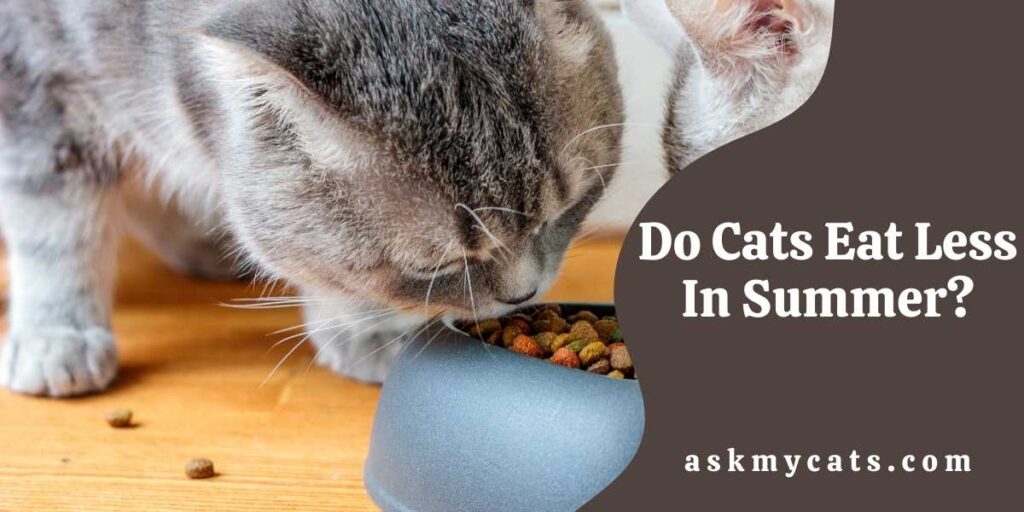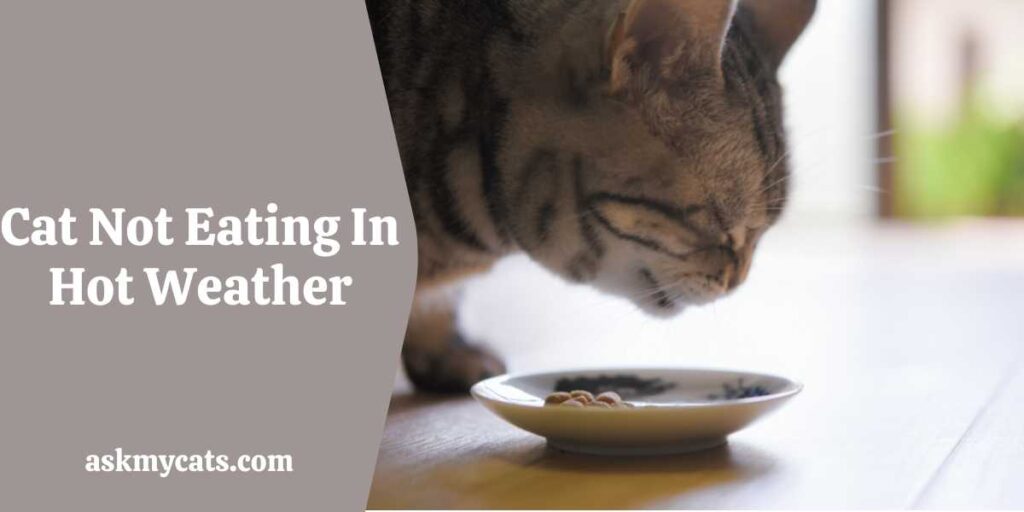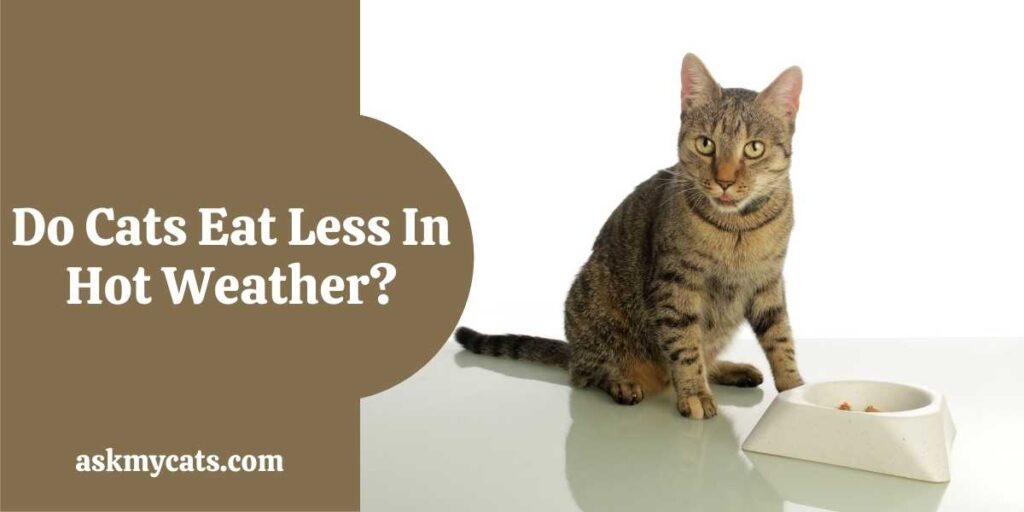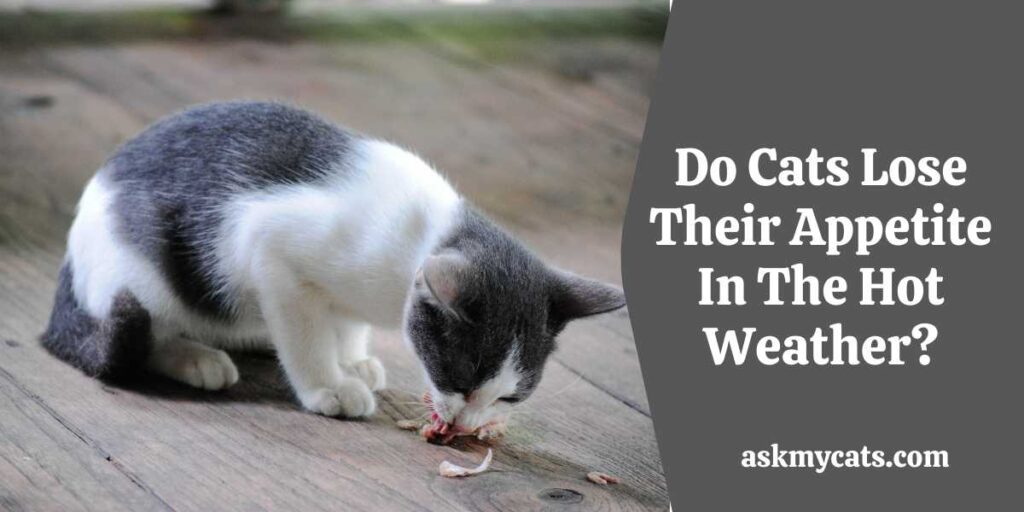Cats spend a lot of time outside during the summer attempting to find cool areas to rest in the shade and are frequently out hunting, which is why you’re probably noticing that your cat isn’t coming in for meals as much as usual.
Most cats just eat less in the summer, especially if it’s really hot, since they don’t require as much energy in the summer as they do in the winter when they must spend it to stay warm.
You may have observed that your cat eats less in the summer, whether you feed her on a scheduled meal schedule or give her free-choice feeding (or a combination of both).
Please continue reading to learn why your cat isn’t eating as much as usual and how to keep them healthy over the summer.


Give Your Cat the Perfect Day
Get the Free Ebook!
Cat Not Eating In Hot Weather
This is very normal. According to new research, most cats will consume 15% less during the summer months, even if they are mostly indoor cats.

In the summer, it is thought that cats expend less energy to regulate their body temperature and hence require less food.
You may have observed that your cat eats less in the summer, whether you feed her on a scheduled meal schedule or give her free-choice feeding (or a combination of both).
The maternal ancestors of domestic cats have been traced back to Africa and the Middle East’s deserts. As a result, cats are well-equipped to deal with extreme heat, even though they may eat less in the summer.
Your cat’s age may influence her capacity to cope with warmer temperatures. If you have an older cat, you may have observed that she prefers to bask in the sun in front of her favourite window during the day.
This might be due to the higher temperature relieving any bone or joint discomfort she may be experiencing. It will also influence her appetite because a sedentary lifestyle reduces your cat’s energy requirements.
Because their temperature regulation has to learn how to work properly, young kittens require higher temperatures than adult cats. As a result, you won’t notice any changes in your kitten’s behaviour or hunger over the summer.
Do Cats Eat Less In Hot Weather?
Cats will eat less in hot weather conditions.

Don’t worry; this is normal because cats use less energy during the warmer months, so it’s nothing to be concerned about as long as they show no other indications of illness.
Cats eat more food in the winter because the colder weather necessitates more energy expenditure and the shorter days increase food-seeking behaviour.
This implies they don’t need to consume as much in hot weather. In fact, they might consume 15% less during the warmer months. This is due to hormonal changes produced by temperature and sunshine variations.
As a result, if you feed your cat the same quantity all year, you’ll find that some food goes uneaten when the weather becomes warmer.
Even if your cat is an indoor cat, the variations in light will most certainly impact their food patterns.
Must Read: 5 Simple Ways to Keep Your Indoor Cat Cool During Summer
Do Cats Lose Their Appetite In The Hot Weather?
Cats will lose their appetite in hot weather.

To keep your cat’s diet varied, change the sort of dry food they eat regularly. On the other hand, Cats do not always like this option and may flatly refuse to eat.
In this situation, attempt to pique his interest by mixing in some of his favourite foods with the dry food, and he’ll become used to it. On the contrary, if your feline companion’s meals are constantly the same, he may refuse to eat out of boredom.
Because warmth has a detrimental effect on their digestive system, cats tend to eat less in the summer. Cats, like humans, are affected by climate change and suffer as a result.
In this instance, it’s best to feed your cat early in the morning or late at night, when the air is cooler, and urge him to drink as much as possible.
If your cat isn’t eating and appears depressed, he may be suffering from psychological issues. Stressful or upsetting events (such as relocation, a loved one’s death, or the birth of a new animal) may cause your cat to lose his appetite.
This is a strong warning if your cat is not eating and is always lying down, exhausted, and sleeps all day. In this situation, you should take the kitten to the veterinarian and have him thoroughly examined since he may have health issues.
If your cat’s lack of appetite is related to boredom or bad habits, modify his diet and excite him with delectable food like canned wet food or something created especially for him at home.
But that’s not all. Changes in the daily routine are also important, so it’s a good idea to play with your cat, engage his interest, and wear him out: this way, you can be sure that his hunger will return!
Why Is My Cat Eating Less In Summer?
In the summer, cats expend less energy to maintain their body temperature and require less food.
Because we all feel the heat in the summer, we tend to eat less and prefer to drink more liquid at this time. Similarly, our felines become overheated and lose their appetite as a result. And if this makes you nervous, don’t be.
Ensure that your cat is well-nourished and hydrated. The lower food consumption is because cats require less energy and calories to remain warm in the summer than they do in the winter.
Do Cats Lose Weight In Hot Weather?
It’s natural for cats to lose weight in the summer due to decreased appetite.
However, you should always visit a veterinarian if your cat’s weight reduction does not appear to be normal or if your cat has any pre-existing medical concerns.
However, if your cat has enough freshwater, feeds frequently, and appears comfortable, there’s no need to be concerned.
Cat owners may have noticed that some cats lose a large amount of weight over the summer. This might be due to various factors, but the most common cause is physiological.
In the summer, when the weather permits them to roam more, outdoor cats tend to lose weight. As a result, the weight reduction is due to increased activity.
According to recent studies, many cats consume 15% less food during summer. This is more frequent among indoor cats, which makes sense.
In the summer, cats use less energy to maintain their body temperatures and require less food.
The age of a cat may impact how they adjust to hot conditions. If you have an older cat, you may have seen how cats like to spend the day in warm spots, such as on the roof.
The sun feels wonderful on their skin, but it’s also possible that it’s because warmer temperatures are known to reduce joint and bone discomfort. However, all that sunbathing will lead to a loss of appetite.
Their energy requirements will also be decreased due to their lower activity levels.
Kittens, on the other hand, demand higher temperatures than adult cats. This is because their temperature controls must adjust to work properly. As a result, you’re unlikely to notice any differences in your kitten’s eating or behaviour over the summer.
What To Feed Cats In Summer?
Cats should eat food with high water content in summer.
Cats require a high-fat, high-protein diet that includes essential animal elements throughout the year. This diet, however, will not work in the heat.
Cats are notorious for being lousy drinkers, so it’s even more crucial to make sure they receive plenty of water during the hot summer months. Most pet parents swear by a 60 percent wet food 40 percent dry food diet for their cats.
It’s advisable to stick to a lighter, more fluid-dense diet.
During the summer, whether you feed your cat dry food from any of the major brands of wet food now and then, along with homemade food, and be sure to have a water-rich food diet.
Heatstroke may affect cats, but they endure the heat a little better than dogs.
Here are some of the food which you can offer to your cat during summer:
- Watermelon treats
- Chicken broth ice cubes
- Boiled eggs without the yolk
- Spinach & rice
- Frozen Peas
Frequently Asked Questions
Should I change my cat’s feeding habits in summer?
The lower food consumption is because cats require less energy and calories to remain warm in the summer than they do in the winter. However, as a cat parent, you must make some dietary modifications to address your cat’s nutritional needs.
Do cats’ eating habits change with the seasons?
In late autumn and winter (Oct – Feb), cats ate the most, whereas, in the summer, they ate the least (June to August). They consumed a moderate quantity of food in the interim. Despite the shift in food consumption, their weight remained constant throughout the year, indicating that they expended more energy in the winter.
How do cats keep cool in summer?
Because cats cannot sweat like humans, they brush themselves to stay cool. When they groom in hot weather, their saliva evaporates from their fur, cooling them down in the same way that sweat evaporates from our skin. Cats drink a lot more water than dogs. Adding a few ice cubes to the kitty’s drink can help keep it chilled.
Final Words
In the summertime, it’s quite natural for your cat to eat less food. The flavor, odor, and texture of the food you’re feeding her are all very important to her. Summer’s high weather will have a significant impact on her dietary habits.
Ask your questions in the comments section below.
